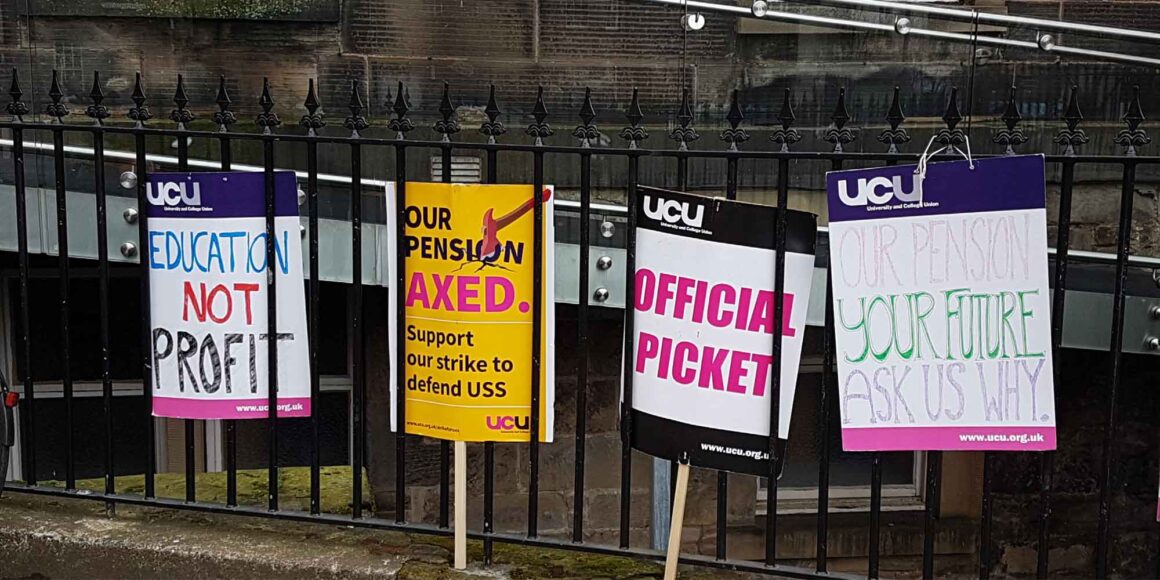

By Dara O’Cogaidhin
THE UCU strike has been called off following a campaign of anti-democratic, bureaucratic manoeuvring by General Secretary Jo Grady. After negotiations with the employers’ organisation UCEA, Grady informed members via Twitter that a ‘two week period of calm’ was agreed which would enable ‘intensive negotiations with the aim of reaching a final agreement’.
There was an immediate backlash on Twitter from UCU members and reps who were blindsided by the decision to ‘pause’ the strikes without any movement on pay or consultation with members. Members of the Higher Education Committee (HEC) were neither briefed nor consulted. Indeed, earlier in the week, Grady had taken the unilateral decision to stand down the democratically elected lay negotiators and replace them with paid officials!
The UCEA announced that the 2022-23 pay negotiation round have reached an ‘impasse’ and have now concluded, meaning the pay offer for most UCU members is 5%. In real terms this is a 15% pay cut over two years: the same offer that 80% of UCU members rejected in a recent e-poll.
However, UCEA broke the ‘period of calm’ one week later when they instructed their members to implement the pay offer in the March 2023 pay roll. Reacting to the employer’s imposition of a pay cut during a cost of living crisis, Grady urged her members to see this ‘development as a positive one – your action has resulted in money in your pockets’.
For many members, Grady’s decision to bypass the democratic structures of the union and call off the strike was redolent of her predecessor Sally Hunt’s capitulation in 2018 – a betrayal Grady denounced at the time.
Nor has there been any significant progress on the other issues. The leadership claimed a victory on ending ‘involuntary zero hours’ contracts, but the UCEA statement made it clear that this was not the case. Unlike the UCU, they are currently ‘consulting’ their members on the issue.
Calling off the strikes without even a concrete offer is not only a mistake but a product of Grady’s strategy. Forty-nine strike days in four years have shown that episodic blocs of action were never enough to win. Publicly declaring her opposition to the HEC’s vote for all-out indefinite strike action in January, Grady has repeatedly undermined the union’s elected bodies and the disputes.
With the membership now demobilised, local branches face an uphill struggle to get the vote out for the current re-ballot and replicate the success of last autumn’s vote.
In the absence of a branch delegate meeting (BDM) organised by the UCU before February’s HEC meeting, London Region called for an ‘unofficial’ BDM to be held the day before. Delegates from over 40 branches passed motions supporting the addition of more strike days in the weeks in the weeks beginning 13 and 20 March to replace the cancelled day.
A lobby was also held outside the HEC meeting calling for recommencement of strike action. However, a majority on the HEC voted against adding more strike days.
Elections for the UCU National Executive Committee end on 1 March, but Grady’s constant circumvention of elected bodies, like the HEC and BDM, demonstrate that left wing leadership is not enough. The most recent capitulation highlights the need for rank and file control of the union. Electing recallable strike committees, bringing together representatives of the different HE unions, will be necessary to put this dispute back on track.
As well as pushing for escalation, strike committees should be prepared to organise independently of the union leadership and act outside the anti-union laws. A coordinated response from across the trade union movement is required to win the pay rises we desperately need, as well as delivering the killer blow to this Tory government.